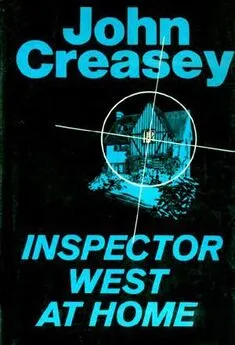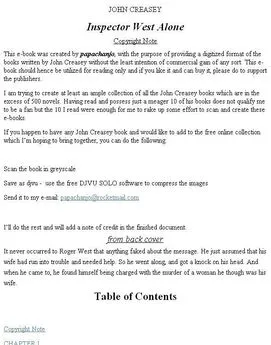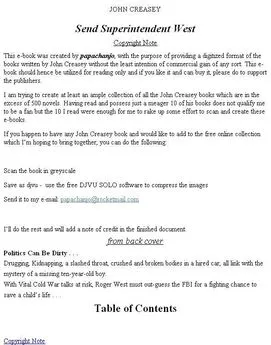John Creasey - Inspector West At Home
- Название:Inspector West At Home
- Автор:
- Жанр:
- Издательство:неизвестно
- Год:неизвестен
- ISBN:нет данных
- Рейтинг:
- Избранное:Добавить в избранное
-
Отзывы:
-
Ваша оценка:
John Creasey - Inspector West At Home краткое содержание
Inspector West At Home - читать онлайн бесплатно полную версию (весь текст целиком)
Интервал:
Закладка:
“That’s fine,” said Roger. “Where are the men ?”
Maude cocked her thumb over her shoulder towards Pep’s private office.
Lanky Sam was propping himself up against the window. A stolid, chunky individual — the man who had been at Bell Street and who had left soon after dawn that day — was sitting on Morgan’s desk. He swore that he had heard nothing of the taxi-driver’s arrival in the garage; Dixon had been put there before Pep’s man had arrived on duty. The other men, middle-aged with jaundiced looks in their eyes and the world-weariness which comes to men whose life is bound up with the sordid business of domestic disruption, were sitting on upright chairs. All of them eyed Roger hopefully.
“Okay, Boss,” Sam said. “Shoot.”
Roger smiled. “I’m no longer the bad boy of the Yard, but I still want some help.”
“So you really admit there are detectives outside the Yard?” Sam said, admiringly. “You learn quick, Handsome !”
“I hope you will,” Roger said. “Listen.”
He told them exactly what he wanted.
He thought Sam seemed disappointed but the men went off cheerfully enough.
He telephoned the Cry and the Echo from Morgan’s office, speaking to both Wray and Tamperly. He gave them a resume of the developments and promised them further revelations later in the day. Both men worked for evening as well as daily papers in the same combine, and he said to each :
“If you can get a paragraph in hinting at startling developments in .the next twenty-four hours, it would help,” he said. “But don’t say that I’m cleared.”
Each man agreed.
Roger replaced the receiver and saw Maude looking up at him narrowly.
“Have you got something, Handsome?”
“I wouldn’t be surprised !” Roger said.
He reached the Green Cat, a small restaurant off Piccadilly, at half past two precisely; he had to wait for ten minutes before Mark and Tennant arrived. At a corner table, where they had coffee, Roger outlined the situation, naming Abbott and Tiny Martin.
“I’m not at all surprised,” Mark said.
“Where do we come in, Roger?” asked Tennant.
Roger said : “I’m going to telephone Oliphant and tell him that Mrs Cartier wants to see him at her flat. Then I shall telephone Mrs C. and tell her Oliphant is coming — let’s say at four o’clock. That will give us time to work.”
“Supposing they don’t bite?” Mark said.
“Then we’ll have to try again.”
“Supposing they do bite?” demanded Tennant.
Roger smiled. “There’s my man ! You’ll be at hand. There is a flat next to the Cartiers which we can use — the tenants will be out but I’ve had their permission to use the flat. It has a lounge window next to the Cartiers. Outside Bonnock House there are little balconies — a man of your agility can easily climb from one to the other. I’ll be in the Cartiers’ lounge and you’ll be on the balcony. I’ll leave it to you when you come in ! They’ll probably try to be violent, but that won’t worry you ! Er — have you ever jumped through a pane of glass ?”
Tennant beamed. “I’ve jumped through every tiling!” he declared.
“Don’t cut yourself,” Roger said. “Well now — I’ll have to be busy. As soon as the message is phoned to Mrs Cartier I want her phone disconnected. Then you’ve got to be installed next door . . .”
He continued, outlining his plans; and by half past three everything was settled. Then he telephoned the Yard, to learn that reports showed no developments except that Sloan had left a message to say that Abbott and Martin had left the Yard, and had gone to AZ Division — that part of the East End which included Rose Street and Leech’s pub. Then, before he rang off, he was told that Oliphant had left his Chelsea house at three-fifteen.
Roger was at Piccadilly when he made the inquiries and he drove immediately to Bonnock House. Crossing the Heath, the quickest route, he remembered Dixon’s story of its loneliness.
He reached the Cartiers’ flat at four-fifteen.
The maid who had reminded him of Pickerell opened the door and told him, a shade too quickly, that neither Mr or Mrs Cartier were at home.
“I’ll wait,” Roger said.
“I don’t think —” the maid began.
Someone in another room said : “No, I don’t!”
Roger smiled. “Take my card in, please. Don’t make it difficult for yourself.”
The maid looked reluctant, but she took the card, approached the door from which the voices were coming and tapped, gingerly. Cartier’s voice was sharp.
“What is it?”
“Excuse me, sir, but a gentleman from —”
Roger put his hand to the door and opened it wider. He almost banged into Cartier, who was coming forward. Behind Cartier was his wife, sitting on the settee where she had greeted Roger on that evening which now seemed an age ago. She looked startled; there was hardly any sign left of the rough treatment from Malone.
“What the devil are you doing here?” Cartier demanded.
“I am a police officer,” Roger said, formally. “I would like you to answer a few questions, sir.”
“Why, West!” exclaimed Mortimer Oliphant, rising from an easy chair and smiling widely. “Well, well, how small a place London is!”
The solicitor’s interruption seemed to startle Cartier, who closed the door on the maid. Mrs Cartier extended a hand which Roger carefully ignored; that made her frown. Oliphant, well dressed, smiling, handsome in his dark fashion, spoke heartily.
“I’d no idea that you knew West, Mrs Cartier !”
“Only in the way of business,” said Roger. He glanced at the set tea-table, seeing that there was early lettuce, jam, what looked like real cream and cakes and pastries. Mrs Cartier rang a handbell and the maid appeared.
“Bring another cup for the Inspector,” said Mrs Cartier. “You will have some tea, won’t you ?”
“Thank you,” said Roger, formally.
“We were just discussing a remarkable thing,” said Oliphant, who seemed too anxious to talk. “I received a message asking me to visit Mrs Cartier on Society business and she received one purporting to come from me — but neither of us sent such a message !”
Roger smiled. “No,” he said, “I sent them.”
Cartier exclaimed : “Mr West, you may be a policeman, but I insist on an explanation.”
“Don’t get impatient, darling,” urged Mrs Cartier.
Oliphant said curtly: “That’s a surprising admission, West.”
“I knew that you and Mrs Cartier did a great deal of business together and wanted the opportunity of meeting you at the same time. I couldn’t think of any other way of arranging it.” He smiled pleasantly. Oliphant was wary, Mrs Car- tier’s smile was obscure, and Cartier appeared to be really bewildered.
Oliphant demanded : “Is this visit official ?”
“Haven’t I made that clear?” asked Roger.
“In that case —”
“But not necessarily aggressive!” Roger assured him. He settled back in his chair and waited for the maid to bring in another cup and saucer, knife and plate. When she had gone, he went on : “I think I ought to be frank with you, Mrs Cartier. Your organisation had been used to hide the activities of a criminal organisation which —”
“But of course !” she said. “I told you it had !”
“I wonder if you realise quite how widespread and powerful an organisation it was,” said Roger. “We have been able to find most of the active supporters and many of the people who helped in the work. Unfortunately, we haven’t found who was really directing the organisation unless it was someone in this room.”
He beamed.
“You have no right to make such slanderous suggestions !” said Cartier angrily, but he turned to his wife. “From the very beginning I disliked the idea. If you had not interested yourself in such a charity, this would never have happened !”
“Now, darling,” said Mrs Cartier. “I don’t think —”
“You’re behaving very aggressively, West, aren’t you?” asked Oliphant.
“How much did you know about this yourself?”
For the first time the solicitor looked really worried. “Are you suggesting —”
“Hasn’t your usual informant sent the warning?” asked Roger. “Yes, Oliphant, you, personally. I have a warrant for your arrest. Also I have one for —”
“If you think my wife —” Cartier began, starting violently. He knocked over his cup, which fortunately was empty. The spoon struck a salt-cellar standing near the lettuce, and salt spilled over the table. “Damn !” ejaculated Cartier. He took a pinch of salt and threw it over his left shoulder, talking as he did so. “If you have the impertinence to suggest that my wife was a party to this criminal business, I shall insist —”
He went on and on and Roger eyed him steadily.
In his mind’s eye he saw Cartier about to follow his wife and stepping into the road to avoid walking under a ladder. He had another picture of Cartier uncrossing dessert knives in this very room. He saw the man throwing salt over his shoulder.
Cartier stopped and Oliphant said : “This is outrageous, West.”
“Is it?” asked Roger grimly. “Mr Cartier, you are obviously very superstitious. Did my meeting with Oliphant on the 13th of December really upset you so much ?”
OLIPHANT broke the silence, making a good show of
Cartier stiffened, Oliphant uttered a sharp exclamation, and the room was very quiet.
CHAPTER 24
A Man Brings a Warning
OLIPHANT broke the silence, making a good show of annoyance and yet pretending not to show it in front of Roger.
“I’m afraid West is getting rather beyond himself,” he said. “If he has developed peculiar ideas about unlucky dates, we need hardly treat his visit seriously.”
“Oh, but you should,” Roger said.
“Damn your impertinence!” snapped Cartier. “I demand a full explanation and an unqualified apology.”
Roger shrugged. “You’re trying hard, aren’t you? Oliphant, we knew last night that you were up to your neck in this, but we waited for you to make a move. You didn’t make it so I forced your hand. I expected you to hear from your informant at the Yard, but he’s been very remiss, hasn’t he?”
“Don’t be a fool!” snapped Oliphant.
“I’m not being,” Roger insisted. “I’ve told you that I have a warrant for your arrest. I have one for Mrs Cartier, too. I can take Cartier away with me, too.” He laughed at them all, but the only one who seemed unaffected was the woman. “I thought this little talk would clear the air,” he added, cheerfully. “You see, before it’s really finished, as far as we are concerned at the Yard we want to find out who has been selling you information and who has been condoning your crimes. Who is it?”
“I have nothing to say, except that this is a grotesque abuse of your authority,” Oliphant snapped.
“Who is it, Cartier?” Roger demanded.
“You must be quite mad !” Cartier was almost shrill.
“You wouldn’t know, Mrs Cartier, would you?” asked Roger. When she made no answer he went on : “This isn’t working out very well. Everything pointed to Mrs Cartier but she first gave me reason to suspect the Society, and I couldn’t see her deliberately attracting attention to herself. Superstitions played an obvious part, and when I saw a manifestation of superstitiousness on your part, Cartier, I wondered whether your hostility towards the Society was really sincere. I thought if I could get you all here together, with the telephone wires disengaged, and that’s easy, for a policeman ! — and we had a heart to heart talk, I might be able to put everything in order. If Mrs Cartier has been an innocent victim of the conspiracy, I don’t want to make trouble for her. Mrs Cartier, you began to suspect what was wrong when you put in the tape-recorder, didn’t you? You hoped to find out whether your worst fears were realised. You knew Oliphant was in it, as well as Pickerell and Lois Randall, but you only suspected your husband’s complicity.”
Читать дальшеИнтервал:
Закладка:










